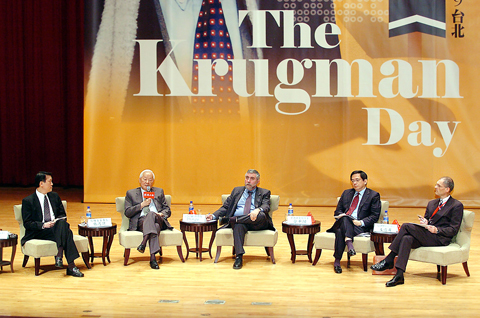The financial crisis poses threats to globalization as nations take measures to shield their economies from external shocks, while struggling to recover from the worst recession since World War II, a visiting Nobel Prize-winning economist said yesterday.
Paul Krugman, who won the Nobel Prize last year for his work on trade theory, told a forum in Taipei that the downturn had stabilized but that it may leave the world economy in near-stagnation for 10 years — similar to what happened in Japan in the 1990s.
“The world as a whole looks quite a lot like Japan during its lost decade,” Krugman said, meaning the recovery could be slow and protracted with high unemployment and weak private demand.

PHOTO: FANG PIN-CHAO, TAIPEI TIMES
OPTIMISM
The Nobel laureate said he was optimistic about the short-term outlook, with the chances of a slump as ominous as the Great Depression dropping to 5 percent.
However, the Princeton University professor was pessimistic about the economic landscape for the next 10 years.
Krugman said he saw threats to globalization following the financial crisis, which he attributed to excess leverage and consumption in the US that have evolved into global economic woes.
The slump has dampened world trade, with demand for durable goods falling sharply, the economist said, adding that the trend would likely continue.
PROTECTIONISM
Krugman also voiced concern that the downturn could fuel protectionism, with some governments implementing measures to protect their industries.
He also cautioned that the crisis may encourage a return of mercantilism, with governments promoting exports and frowning on imports.
That would help realize “the beggar thy neighbor” phenomenon where nations compete to reduce export costs to boost their trade surpluses, Krugman said.
Krugman advised against the practice as people already question the wisdom of debt expansions by governments that serve to benefit other countries such as China.
“Some are asking why we got the debt, they got the stimulus,” he said.
“Protectionism is hard to reverse once it is in place,” Krugman said.
IMBALANCES
Krugman added that persistent currency imbalances between nations amid the economic slump would prove unfavorable to globalization in the end.
The economist cited China as a major example, saying the country had strangely engaged in exports of currency capital to boost its foreign exchange reserves.
He saw little chance of further monetary interventions as central banks had already cut interest rates to record-low levels.
The root of the economic woes lies in slumping demand, Krugman said, not inadequate supply, and they tend to last longer when financially driven.

JITTERS: Nexperia has a 20 percent market share for chips powering simpler features such as window controls, and changing supply chains could take years European carmakers are looking into ways to scratch components made with parts from China, spooked by deepening geopolitical spats playing out through chipmaker Nexperia BV and Beijing’s export controls on rare earths. To protect operations from trade ructions, several automakers are pushing major suppliers to find permanent alternatives to Chinese semiconductors, people familiar with the matter said. The industry is considering broader changes to its supply chain to adapt to shifting geopolitics, Europe’s main suppliers lobby CLEPA head Matthias Zink said. “We had some indications already — questions like: ‘How can you supply me without this dependency on China?’” Zink, who also

Taiwan Semiconductor Manufacturing Co (TSMC, 台積電) received about NT$147 billion (US$4.71 billion) in subsidies from the US, Japanese, German and Chinese governments over the past two years for its global expansion. Financial data compiled by the world’s largest contract chipmaker showed the company secured NT$4.77 billion in subsidies from the governments in the third quarter, bringing the total for the first three quarters of the year to about NT$71.9 billion. Along with the NT$75.16 billion in financial aid TSMC received last year, the chipmaker obtained NT$147 billion in subsidies in almost two years, the data showed. The subsidies received by its subsidiaries —

At least US$50 million for the freedom of an Emirati sheikh: That is the king’s ransom paid two weeks ago to militants linked to al-Qaeda who are pushing to topple the Malian government and impose Islamic law. Alongside a crippling fuel blockade, the Group for the Support of Islam and Muslims (JNIM) has made kidnapping wealthy foreigners for a ransom a pillar of its strategy of “economic jihad.” Its goal: Oust the junta, which has struggled to contain Mali’s decade-long insurgency since taking power following back-to-back coups in 2020 and 2021, by scaring away investors and paralyzing the west African country’s economy.

RE100 INITIATIVE: Exporters need sufficient supplies of renewable energy to meet their global commitments and remain competitive, the economics ministry said Local export-oriented manufacturers, including Taiwan Semiconductor Manufacturing Co (台積電), require sufficient supplies of green energy to maintain their competitiveness and regulations already ensure that renewable energy development adheres to environmental protection principles, the Ministry of Economic Affairs said yesterday, as the legislature imposed further restrictions on solar panel installations. The opposition-led Legislative Yuan yesterday passed third readings to proposed amendments to three acts — the Environmental Impact Assessment Act (環境影響評估法), the Act for the Development of Tourism (發展觀光條例) and the Geology Act (地質法) — which would largely prohibit the construction of solar panels in some areas. The amendments stipulate that ground-mounted solar